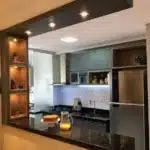As the world increasingly turns towards eco-conscious living, the concept of sustainable design has gained significant traction. When it comes to creating a modular kitchen, choosing materials with environmental considerations in mind is not only a responsible choice but also a trend that aligns with a greener, more sustainable future. In this blog, we’ll explore the innovative use of sustainable materials in modular kitchens, showcasing how eco-friendly choices can transform your cooking space into a haven of style and environmental responsibility.
Bamboo: A Sustainable Superstar:
Bamboo is rapidly emerging as a favorite among eco-conscious homeowners. Known for its rapid growth and renewability, bamboo is a highly sustainable material for kitchen cabinets, countertops, and even flooring. Its strength and durability rival traditional hardwoods, and the versatility of bamboo ensures a sleek and modern aesthetic for your modular kitchen.
Recycled and Reclaimed Wood:
Opting for recycled or reclaimed wood for your modular kitchen not only reduces the demand for virgin timber but also adds a unique character to your space. Salvaged wood from old barns, factories, or even wine barrels can be repurposed into cabinets, countertops, or feature elements, providing a warm and rustic charm to your kitchen while minimizing environmental impact.
Recycled Glass Countertops:
For a contemporary and eco-friendly touch, consider recycled glass countertops. These countertops are made from crushed, recycled glass mixed with resins, creating a durable and visually stunning surface. The range of colors and textures available allows for customization to suit various design styles, making recycled glass a versatile and sustainable option for your modular kitchen.
FSC-Certified Wood:
When selecting wood for your modular kitchen, look for the Forest Stewardship Council (FSC) certification. This certification ensures that the wood comes from responsibly managed forests, promoting biodiversity and ethical forestry practices. FSC-certified wood can be used for cabinets, flooring, and even furniture, providing a guilt-free solution for homeowners who prioritize sustainability.
Cork Flooring:
Cork is a renewable and biodegradable material that is harvested from the bark of cork oak trees. Beyond its eco-friendly credentials, cork is naturally resistant to mold, mildew, and pests, making it an ideal flooring option for kitchens. Its soft and comfortable surface also makes it a practical choice for standing for extended periods while cooking.
Low VOC Paints and Finishes:
In addition to choosing sustainable materials, consider the impact of paints and finishes on indoor air quality. Opt for low VOC (Volatile Organic Compound) or zero VOC paints and finishes to minimize harmful emissions. These eco-friendly options contribute to a healthier indoor environment, ensuring that your modular kitchen is not only visually appealing but also promotes well-being.
Conclusion:
Designing a modular kitchen with sustainability in mind is a powerful step towards reducing your environmental footprint. The use of eco-friendly materials not only contributes to the preservation of natural resources but also adds a unique and conscientious touch to your living space. As the demand for sustainable living continues to grow, incorporating these green choices into your kitchen design will not only make a positive impact on the planet but also create a kitchen that reflects your commitment to a more sustainable and responsible lifestyle. So, let your kitchen be a beacon of eco-consciousness by embracing sustainable materials in your modular kitchen design.


